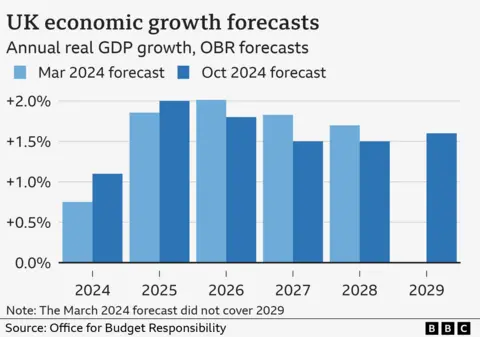
 Getty Images
Getty Images
The UK's economy will grow slightly faster than expected this year and next year, according to the government's official forecaster.
Presenting the Budget, Chancellor Rachel Reeves said the Office for Budget Responsibility (OBR) predicted the economy would grow by 1.1% this year, up from its previous prediction of 0.8%.
The OBR also forecast higher growth - of 2% - in 2025, up from its March forecast of 1.9%.
However, in 2026 and towards the end of the parliament, growth is predicted to be slightly weaker than was forecast in March.
The chancellor said the Budget would mark "an end to short-termism" and that the OBR would from now on also provide a 10-year growth forecast when it publishes its analysis of the Budget.
"Every Budget I deliver will be focused on our mission to grow the economy," Reeves said.
However, the OBR is forecasting lower than expected growth for the end of the parliament. Growth in 2027 and 2028 would be 1.5%, down from the 1.8% and 1.7% forecast in March.
The OBR expects inflation to remain slightly above the Bank of England's 2% target until 2029.
It is hard it to make precise predictions several years ahead, and economic forecasts are regularly updated.
The combination of stronger growth early in the parliament, followed by weaker growth in later years, suggests the cumulative impact, or the size of the economy by the end of the parliament, will not be very different overall.
In total the economy is set to grow by nearly 8.2% in total by 2028. In March it was forecast to grow by nearly 8.5%.
However, Paul Johnson, head of the independent economics think tank the Institute for Fiscal Studies, described the growth forecast as “pretty disappointing stuff".


How much the economy grows is a key factor limiting what the government will be able to do over the course of the parliament.
If growth is strong, tax revenues are likely to increase, meaning there is more to spend on public services, or on reducing taxes, and to pay the interest on government borrowing. If growth is weak, the government is likely to have to cut back on what it would like to do.
Reeves said while there would be no return to austerity, there would “still be hard decisions to come”.
But she said the OBR believed Labour's plans would have a positive impact on the "supply capacity of the economy" or its ability to grow.
The government bases its policy plans on the forecast of the OBR. However, economic forecasting is not precise.
Predictions can be affected by a huge range of factors including geopolitical risk, global energy prices, and events in the world's other large economies. Small changes in any of these factors can have an impact on the path of UK growth.
Reeves said she would “catalyse £70bn of investment” in the UK through a new National Wealth fund, transform planning rules to “get Britain building”.
She said she would work with devolved governments in Wales, Scotland and Northern Ireland, as well as regional mayors, to boost local and regional growth plans.

 Movie
Movie 3 months ago
63
3 months ago
63 






![Presidents Day Weekend Car Sales [2021 Edition] Presidents Day Weekend Car Sales [2021 Edition]](https://www.findthebestcarprice.com/wp-content/uploads/Presidents-Day-Weekend-car-sales.jpg)



 English (United States)
English (United States)